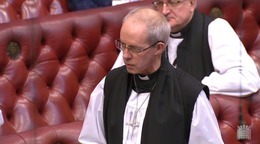The Archbishop of Canterbury supports military action against ISIS and also asks to counteract the ideas that are behind these kinds of organizations.
Welby spoke to the General Synod about military action. ACNS:
The Archbishop of Canterbury, Justin Welby, has backed the use of military intervention in the fight against Daesh (also known as ISIS, ISIL, or IS). His backing came during a debate at the Church of England’s General Synod this week on a motion about the refugee crisis.
He told Synod members that he welcomed the motion, but told them that if they passed it, with its call for the establishment of “safe and legal routes to places of safety . . . for refugees who are vulnerable and at severe risk”, the Synod would essentially commit itself “to supporting the use of armed force overseas.”
He said: “The reality of working in those areas to create routes to places of safety must include some kind of forceful response. It is almost impossible to see how it could be done otherwise. . .
“We must also recognise that in much of the Levant and the Middle East – and in many other parts of the world including north east Nigeria, including Burundi and other places – the forces that are driving people out into being refugees may need to be confronted.
In response to the Prime Minister, the Archbishop asks if the government is prepared to deal with the ideology behind the extremism.
“I thank the Leader of the House for the repetition of the statement, and particularly the publication of the Foreign Affairs Committee report, and particularly in both the statement and the report for the seriousness of their emphasis on a comprehensive approach – both of the seriousness of military action but also of the integration of soft and hard power; of the support for jobs, education, family and community life and stability, and of community flourishing in the neighbouring countries, which comes out very strongly and is very welcome.
“The test will obviously be the total mobilisation of effort in a focussed way that recognises the long-term needs of security for indigenous populations, and particularly the Christian populations, being harried out of the area at the time.
“For the first time in almost 300 years, we’re facing a conflict that has a distinct theological and religious element which we have not faced before. Recent studies demonstrate the theological basis of extremist groups behind jihadist thinking.
“Does the Government realise that in facing this conflict there must be an ideological response that is not only national in dealing with the threat of extremism here, but is global in challenging the doctrines that draw so many people to support ISIS internationally? And what steps are they proposing to take to put together the conflict at the ideological and theological level, as well as at humanitarian and military?”

